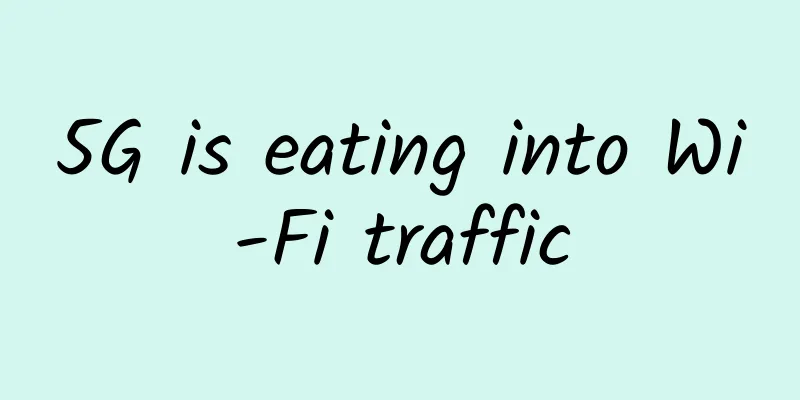5G is eating into Wi-Fi traffic

|
With the commercialization of 5G and the increase in 5G users, the total wireless data traffic has accelerated, but data shows that Wi-Fi traffic has declined. On March 2, 2020, South Korea announced its total wireless traffic data for January 2020, exceeding 600,000TB for the first time, reaching 608,323TB, of which 4G and 5G data traffic were 463,118TB and 131,241TB respectively, but Wi-Fi traffic was only 13,826TB, accounting for only 2.27% of the total wireless traffic.
The statistics from the Ministry of Science and ICT of South Korea show that in January this year, the average traffic per person of South Korean 5G users was 27.1GB, which is three times that of 4G users (8.52GB). Since Wi-Fi is shared, it is impossible to calculate the per capita traffic, but in terms of total traffic, South Korea's total Wi-Fi traffic in December last year was 15,110GB, which means that the total Wi-Fi traffic in January decreased by 8.5% from the previous month. There are two possible reasons for the decline in Wi-Fi traffic: One reason is that after 5G commercialization, some users no longer use Wi-Fi frequently, especially users of 5G high data traffic packages and unlimited traffic packages. At present, the 5G charges of South Korea's three major operators are roughly as follows: 8-9GB of data traffic per month costs 50,000 won (about RMB 292), 150-200GB of data traffic per month costs about 70,000 won (about RMB 409), and unlimited traffic packages require a monthly payment of more than 80,000 won (about RMB 468). Second, the speed and stability of Wi-Fi are far lower than those of 5G, which leads to its gradual marginalization. To this end, Korean industry insiders have called for increased investment in Wi-Fi construction and the active introduction of the new generation of Wi-Fi 6 and Wi-Fi 6E that are more suitable for high-definition video streaming and high-speed wireless communications, in order to improve Wi-Fi wireless performance and reduce users' communication cost burden.
According to statistics released by the Ministry of Science and ICT of South Korea, as of the end of January, the number of 5G users in South Korea has approached 5 million. Among them, SKT has 2,215,522 5G users, accounting for 44.68%; KT has 1,507,190 5G users, accounting for 30.39%; LG U+ has 1,235,500 5G users, accounting for 24.91%. |
<<: Low-power wide-area network LPWAN: Can different factions of technology coexist?
Recommend
The operators’ 5G investment budget has been determined. From construction to application, what other challenges are there to overcome?
According to statistics from China News Service, ...
5G is officially commercialized in seven countries. Review of network events in the first half of 2019
On June 6, 2019, my country's 5G license was ...
Do 5G operators still need to prepare for the Metaverse?
The 2022 Mobile World Congress (MWC2022) held thi...
In the 5G era, where will the 2G-based temperature and humidity sensors go?
[[349400]] With the construction of 5G network ba...
Reject poor digital experience! Riverbed creates agile and visual management solutions
According to an IDC report, by 2018, 67% of the w...
How is the ETag value in the HTTP response header generated?
The generation of etag needs to meet several cond...
TCP/IP Appetizer: HTTP
[[381273]] This article is reprinted from the WeC...
The TCP three-way handshake is well-known, but what about unexpected situations? What about packet loss? What about intentional non-reply of ACK?
[[312203]] 1. Preface When we talk about the TCP ...
Huawei releases the OptiXstar Gigabit Smart Optical Modem flagship product, opening up the Wi-Fi 6 home arena!
[51CTO.com original article] On March 30, Huawei ...
Wu Hequan: The proportion of IPv6 traffic in domestic applications still needs to be improved
At the "2020 China IPv6 Development Forum&qu...
What should I do if I forget my Wi-Fi password? You can retrieve the password through Windows
With the development of technology, WiFi plays an...
Huawei aims to be a smart city incubator providing basic energy
During the just concluded National People's C...
spinservers San Jose China Telecom Network VPS Simple Test
Some time ago, I shared the information about spi...
Megalayer Summer Promotion: US servers start from 99 yuan/month, Hong Kong high-defense servers start from 299 yuan/month
Megalayer launched a summer ice point special off...
Don't be afraid of DNS interview questions anymore: experts use 1 big picture and 9 steps to easily deal with them
[[319621]] [51CTO.com original article] It's ...









